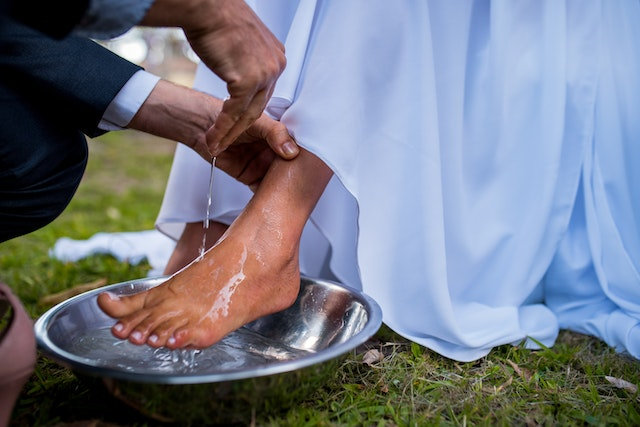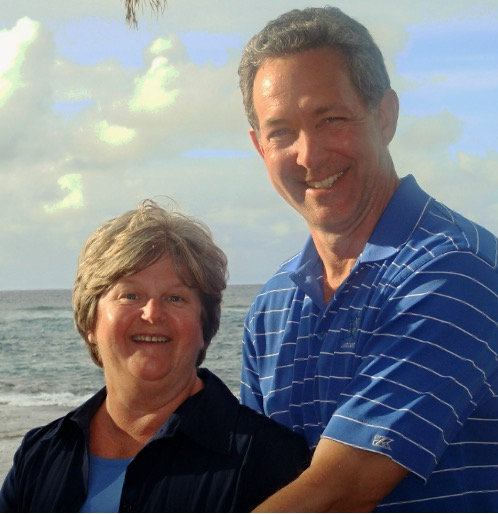Introduction
About forty years ago, five years into the life of the Boston Church of Christ (https://www.bostonchurch.org) and its many mission plantings in our fellowship of the International Churches of Christ, Pat Gempel created a women's anthology, written by women on the front lines of faith, entitled The Upward Call.
Last year, Pat and her friend Amanda Frumin were inspired to republish this volume, with two main goals in mind: to issue once again an Upward Call for Christian women to be actively engaged in teaching one another the principles of Biblical discipleship to Jesus and spiritual formation; and to raise money for the Philadelphia-based youth camp, Camp Hope for Kids, (https://www.hopeforkids.org/programs) a life-changing place of miracles for young people.
Learning to Love Response
by Hannah Desouza, Cambridge, Massachusetts, USA
As a new student of theology, surrounded by much philosophizing and theorizing of theological questions, if I were to be asked the question, “which commandment in the law is greatest?” my response could easily turn into a twenty-page paper (complete with footnotes and a bibliography). So there is something refreshing about the simplicity of Jesus’ answer:
“Jesus replied: ‘Love the Lord your God with all your heart and with all your soul and with all your mind.’ This is the first and greatest commandment. And the second is like it: ‘Love your neighbor as yourself.’ All the law and the prophets hang on these two commandments” (Matthew 22:36-40)

In effect Jesus was declaring that all that had come before might be encapsulated in these two instructions. Love God and love others. Simple? Seemingly. Yet, as Joyce and Tanya have explored, this is no small feat to put into practice.
It is special to be writing this chapter from London, the city where decades previously both Joyce and Tanya moved to as young women in the hope of imparting the love of God to an overwhelmingly secular nation. Their faith and the decision to love a people not their own left an imprint on the hearts of many of the brothers and sisters here, my own family included. In fact, it was Joyce’s courage to share her faith with a young woman she met in the dorms at Boston University some forty years ago (the wonderful Dickye Palmer) that would lead to Dickye joining her on the mission team to London and sharing her love for God with a young British music student named Julie Inglis that she met in a train station, who just so happened to be my mother (!) So you could say I am eternally grateful to Joyce. And grateful to be following the footsteps of the spiritual mothers and grandmothers that loved and walked with God before me.
Love God
So what does it mean for us to love God, as the greatest commandment asks of us? As a young teenager I remember a season when I was completely absorbed by this question. The idea that the all-powerful, all-sufficient Creator of the universe would want to be loved by me was a baffling thought to begin with, but then how would He receive this love? What would it look like for me to love Him? As with any relationship, I quickly discovered, it is not possible to love someone you don’t know or spend time with! Growing up I have vivid memories of coming down the stairs in the morning and seeing my mother at the dining room table, tea in hand, Bible open, deep in contemplation. It didn’t matter how busy the day ahead was or how tired she was from the day before, she could never miss her morning appointment with God. It wasn’t religion, it was relationship. James, the brother of Jesus, writes “Come close to God and he will come close to you” (James 4:8, NLT). I am convinced that my mother has the depth of love and closeness with God that she does because of this habit she started as a young Christian, of beginning each day coming close to Him. A habit that I want to encourage you, is never too late to begin.
Joyce and Tanya rightfully point out that we can often associate love with a feeling or mood. While it is wonderful when those feelings of love are present (and with intentionality and cultivation they can certainly grow!) it is significant that feelings are not what God uses to measure love. Coming across 1 John 5:3 was another penny-drop moment for me when it came to what loving God might look like: “This is love for God: to keep his commands.” So simple! Obedience. If you have been around the church for any length of time you have probably been asked by someone, “what is your love language?” A term that originated in Gary Chapman’s book The Five Love Languages which categorizes the unique ways in which different people feel love. Some of the possible languages being “Physical touch”, “Acts of Service”, “Words of Affirmation” etc. In this respect, it was enlightening for me to think that God’s “love language” would be obedience!
Obedience can be somewhat of a bad word today, particularly in the West where a primacy is placed on independence, and individual agency and autonomy. Yet in choosing to obey God, and submit our will to His, what we are ultimately communicating is “I trust you. I trust that, even though I don’t always understand it, the way you want me to live is better than any I could choose for myself.” Every time we choose to follow the commands of God outlined in Scripture over our own desires (even if it’s with gritted teeth!) we are demonstrating our love for God through obedience. The truth is though, any love we can show God is simply a response to the incredible love we have first received from Him.
Loved by God
1 John 4:19 says “We love because He first loved us.” The whole reason we are able to love is because we have first been shown it. The love of God is an initiating love, a love that pursues and takes the first step. When God makes a covenant with Abraham in Genesis, custom would usually see both parties walk between the bloodied halves of animals. By doing so each person was declaring, if I do not uphold my part of the covenant may the same bloodshed fall on me. It was a demonstration of utter commitment, sealed in blood. Yet, what ends up happening instead is nothing short of remarkable. As the sun goes down, God causes Abraham to fall into a deep sleep and then proceeds to walk the bloodied trail, alone. He alone signs the contract and commits to upholding the covenant and in doing this gives Abraham the assurance that when he falls short (as he inevitably will) it is God that will pay for it with his own blood. And, some 2000 years later on a hill called Golgotha, He did just that.
God’s love for us is hard to wrap our minds around. Paul describes it as “love that surpasses knowledge” (Ephesians 3:19). I think sometimes the wrestle we might face with truly accepting or believing we are loved in this way comes when we imagine God’s love to be the same as human love. Thankfully, they could not be more different. While the love of even the best of men can waver and be affected by circumstances, the love God has for us is utterly dependable. As Joyce and Tanya point out, in the Psalms alone God’s love is described as “unfailing” some twenty-six times! A beautiful prayer that the apostle Paul prayed for the brothers and sisters in Ephesus was for them to be able “to grasp how wide and long and high and deep is the love of Christ” (Ephesians 3:18). Why is it so important for us to grasp the love of God? Henri Nouwen’s Life of the Beloved is a beautiful little book that speaks to the idea that our identity as the beloved is the truest thing about us, and out of which all our actions should flow. Certainly, I believe the love of God ought to be the motivation behind all that we do as Christians. It is easier to obey when we know how loved we are by the one that gave us the commands. And it’s easier to love others (even the difficult ones!), when we understand that God loved us when we were in our worst possible state (Romans 5:8). Having this powerful example of love, we have now been called to imitate it. 1 John 3:16 reads, “This is how we know what love is: Jesus Christ laid down his life for us. And we ought to lay down our lives for our brothers and sisters.”
Love Others
If you were to ask the average person today what their opinion is of Christians, I sadly do not believe “loving” would be high up on the list. I regularly find myself in conversations with classmates from a whole host of religious and unreligious backgrounds. It is sad to me that many of them associate Christianity today with rule-bent institutions, colonialism, clerical abuse, or mobs picketing outside abortion clinics and gay pride parades. For a people that professes to follow a God who declared to be love itself (1 John 4:16) it is good to reflect on what should people’s experience of Christians—both us as individuals and collectively as a church—feel like?
Probably the most famous passage in the Bible on love, which you often find quoted at weddings, is 1 Corinthians 13. It is a powerful example of what loving “with actions and in truth” (1 John 3:18) might look like, and I would encourage you to revisit Joyce and Tanya’s chapter as they have helpfully broken it down verse by verse. Another helpful exercise is to choose a gospel and read through it with a particular focus on the ways Jesus loved people, as so many of the attributes in 1 Corinthians 13 you will discover are embodied in him; whether it was his patience and kindness with people, the way he wasn’t afraid to share the truth with those that needed to hear it, or the way he selflessly looked to the needs of others above his own.
One of my favorite passages is the account of Jesus washing the feet of his disciples (read John 13:1-5). It is the last time that Jesus will gather with his friends like this before his death and, instead of the focus being on himself (as we might expect from someone who is about to go through a terrible ordeal) Jesus decides to leave them with one final lesson. John writes “Having loved his own who were in the world, he loved them to the end.” And how did that love manifest itself? In service. It is remarkable to think that fingers that formed the mountains and palms that could hold the oceans (Psalm 95:4-5) now dip into a dirty basin of water and tenderly wash the day’s grime from between toes!

In 2021 I served as a youth minister for the Chisinau Church of Christ in Moldova and for one of our teen devotionals I wanted us to recreate this scene. After asking for volunteers we revealed the towels and basins of soapy water and watched as eyes widened at the realization of the activity they’d be doing. To their credit, none of them backed out! With a towel draped over their shoulders, the coolest of teenagers was now on their knees humbly washing their friend’s feet, while the friends squirmed and covered their eyes, embarrassed at this act of service. Afterwards both parties reflected on how it felt, to serve and be served, and all had a newfound admiration for the love of Christ that Passover evening.
As a young millennial, something my generation is very good at is having boundaries and knowing the importance of self-care. Yet I am realizing that I need to be careful that this doesn’t turn into selfish care, where I resist any activity that makes me uncomfortable. As the truth is, the love God calls us to is not always comfortable! I often think about what went through Jesus’ mind as he brought the basin to the feet of Judas Iscariot. If I were him, I would have been tempted at the very least to “accidentally” pinch a toe (which is why I am not the Messiah!) Yet Jesus continued as before, to tenderly clean, wipe, dry his feet, moments before Judas would head out into the night to betray him to the chief priests. Jesus’ love is radical. It’s a love that’s not afraid to be close to people, to get dirty, to humble oneself in service to another. And it’s a love that he calls his followers, both past and present, to imitate. Wouldn’t the church be a glorious place, and a light in our communities, if we did just that?

Learning to Love
by Joyce Arthur and Tanya Lloyd
The greatest commandment, as recorded in Matthew 22:37 is to “Love the Lord your God with all your heart, with all your soul and with all your mind.” The second greatest commandment is to love your neighbor as yourself. Jesus clearly considered loving God and others as his most important message, emphasizing it as the root of every aspect of the Christian life. Matthew 22:40 goes on to say that everything God has taught and recorded in his word “hangs” on the command to love. Without learning what love is and how to love, we cannot be obedient to God’s greatest commandments.
What is love for God and how can we learn to love?
1 John 5:3 states that love for God is obedience to his commands. Today, love is thought of as a feeling or mood which is not how God defines “love.” God makes love very tangible by telling us simply to obey him. Obedience is a learning process. One sees what is right and puts it into practice as Jesus did in 1 John 3:16–18. Christ demonstrated his perfect love by laying down his life for us. We are admonished to do likewise. That kind of obedience will develop our ability to love as Jesus did and will give us a foundation for learning how to love.
Love is Patient
I Corinthians 13:4–7 contains God’s explicit definition of love in practical terms: Love is patient, love is kind. It does not envy, it does not boast, it is not proud. It does not dishonor others, it is not self-seeking, it is not easily angered, it keeps no record of wrongs. Love does not delight in evil but rejoices with the truth. It always protects, always trusts, always hopes, always perseveres. Love is Patient—it is not easily angered.

Your interaction with others during the trials you experience with them reveals how much you really love them. A loving woman is not easily angered or irritated nor does she keep a record of wrongs. Instead, she responds with patience as in Proverbs 14:29: “Whoever is patient has great understanding, but one who is quick-tempered displays folly.”
The Christian woman ought to bear calmly with others through difficulties, helping them to resolve conflicts rather than complaining or being intolerant of weakness. James 1:19–20 teaches that: “Everyone should be quick to listen, slow to speak and slow to become angry, because human anger does not produce the righteousness that God desires.”
In both our marriages, we have been blessed with husbands who have loved us in this way, especially during the early days of the ministry here in London. We know they love us because they are steadfast in their support, correcting and encouraging us with great patience. We also feel loved because they don’t keep remembering our wrongs. Proverbs 10:12 warns that “hatred stirs up dissension, but love covers over all wrongs.” If we want to truly love others, we must truly forgive and forget their mistakes, without storing up past wrongs for future ammunition. Correct others’ errors and move on, bearing patiently with them through whatever happens next.
Love is Kind
Love is Kind—it is not rude. Kindness is a quality that causes a chain reaction. When someone does a kind deed for you, the natural response is to do something kind in return. We should have the same response toward God for the great kindness and mercy he has shown us as sinners. Ephesians 4:32-5:2 describes the loving kindness of God that we should imitate: “Be kind and compassionate to one another, forgiving each other, just as in Christ God forgave you. Follow God’s example, therefore, as dearly loved children and walk in the way of love, just as Christ loved us and gave himself up for us as a fragrant offering and sacrifice to God.”
Christ demonstrated his love by laying down his life for us, perfecting kindness by doing something he knew we didn’t deserve. God shows us that same act of mercy by forgiving us while we are still in our sins. Ask yourself: how am I responding to his kindness?
One sister in our congregation shows her appreciation for God’s kindness by being a true friend and neighbor. She is known and loved by virtually everyone in her residence hall because her door is always open to offer a cup of tea or a listening ear. The result of that lifestyle of love has been abundant fruit during her first six months as a Christian.
In contrast to kindness, rudeness is a great obstacle in our relationships. We can be rude in many ways, such as being abrupt, impatient, and insensitive or engaging in foolish talk, coarse joking, and bitterness. When love is lacking in our lives, we will act that way toward our families, friends, and acquaintances. Such damage can be avoided by continuing the chain reaction of God’s kindness and acting out of His love.
Love Rejoices in the Truth
Love rejoices in the truth—it does not delight in evil. In learning to love, one must determine a source from which to learn. As Christians, we logically turn to God’s word, the Bible, as our standard. 2 Timothy 3:16–17 advises us that God’s word is useful for teaching and training us to be thoroughly equipped for every good work. The Scriptures can show us what love is and develop our ability to love.
God is very serious when he tells us that to love him is to obey him. In Romans 2:8, he warns that there will be “wrath and anger for those who are self-seeking and who reject the truth and follow evil.” We must choose whether we will follow truth or evil. There is no middle road. God created us. He knows us. He knows how we can live a peaceful and fulfilling life, now. Once we decide to rejoice in the truth, we can learn to love others more completely because we will be holding ourselves to obedience and striving to love others as God wants us to love. We will no longer delight in evil, talk about others by gossiping or being divisive. Proverbs 16:28 states: “A perverse man stirs up dissension, and a gossip separates close friends.” Delighting in evil will destroy love. Let us strive to conquer that sin by committing ourselves to be always rejoicing in the truth of God’s word.
Love Always Protects
Love always protects—it is not self-seeking. God’s love for those who follow him will always be protected. Psalm 37:28 reads, “For the Lord loves the just and will not forsake his faithful ones. They will be protected forever.” He guards us against Satan’s traps and offers us eternal shelter from spiritual harm. It takes self-denial to protect someone else. God sent his only Son to save us from condemnation. In return, we are to love others by denying ourselves for their protection.
Philippians 2:3-4 explains this more fully: “Do nothing out of selfish ambition or vain conceit. Rather, in humility value others above yourselves, not looking to your own interests but each of you to the interests of others.”
An extreme example of this kind of protection is the true story from 1978 of Bill Quinlin and his nephew David. The two were sailing together and ran into a hurricane which capsized the boat. They were stranded on a life raft with limited rations of food and water. Bill realized that David could survive twice as long by himself, so he unselfishly swam away for the raft without ever looking back. (https://www.nytimes.com/1978/07/23/archives/coast-man-saves-nephews-life- by-swimming-to-his-own-death.html ) Hopefully we will never be called to a life-or-death decision like that, but we are daily faced with the choice of who to put first, ourselves or someone else. If we are committed to obeying God, the decision is already made, and we will automatically put others first in our lives.
Love Always Trusts
Love always trusts—it does not envy. Another way we can show our love to God is to completely put our trust in him. There are numerous passages addressing this concept, including salvation. God truly has an unfailing love for us on which we can depend. However, He requires our obedience to His teachings.

Consequently, when two people put their trust in God, they will also have a mutual trust in each other. God is our unifying common denominator. That concept proves true in a Christian marriage. When both partners are committed to living for God, they can be bound together by complete trust, knowing that every step in their lives will be taken to please God and draw closer to Him and their mate.
This loving, trusting bond can be broken by sin of envy (or other sins like immorality). James 3:16 warns that “where you have envy and selfish ambition, there you find disorder and every evil practice.” People tend to look out for themselves first and feel threatened if someone else is honored or blessed more than they are. Envy is also a consistent partner with selfishness. Sin destroys relationships. We must continually examine our hearts.
For example, two women in our congregation took a Bible class exam which one passed, and the other did not. The decision was made to give a second test for those who had not passed. The woman who had failed studied very hard and passed the second test with flying colors. Her friend was envious of the opportunity offered her instead of being excited about her learning more from the Bible. Trust cannot exist in a relationship like that.
Envy will stop us from being able to love each other, and it will cause severe damage to our overall spiritual condition. Proverbs 14:30 states that: “a heart at peace gives life to the body, but envy rots the bones.” In our efforts to learn to love, let us remember that trust in our relationship will bring peace to our lives, but envy will separate us from God and others.
Love is not Boastful
Love—it is not boastful or proud. Another way we can show our love for others is to share with them our hope in the glory of God as Paul did in Romans 5:2b-5: “And we boast in the hope of the glory of God. Not only so, but we also glory in our sufferings, because we know that suffering produces perseverance; perseverance, character; and character, hope. And hope does not put us to shame, because God’s love has been poured out into our hearts through the Holy Spirit, who has been given to us.”
Our hope should be in God who works through any and every situation. We must learn to rejoice through hard times and suffering, standing firm and being confident that our hope in the Lord’s will cannot disappoint us. We can then share that faith with others to help them develop a similar hope in God’s glory.
For example, the Lloyds (Tanya, one of the authors of this article and her husband) recently had a bad fire in their new flat. It was difficult to rejoice as they first encountered the charred remains and considerable smoke damage. But because their hope was in God and not in their possessions, they did not despair. The Lord used that situation for the best, and within months, the wife of the carpet layer had become a Christian.
Many times, though, our love for others can be hindered by being boastful or proud. The Lord declares in Jeremiah 9:23–24 that we should not boast of our wisdom, strength, or riches but only in the delight of knowing our Lord. Arrogance and boasting are ungodly. When thinking too much of oneself, it is nearly impossible to think about others, to meet their needs and to love them. Let us take Paul’s admonition in Galatians 6:14 to “never boast except in the cross of our Lord Jesus Christ.” Let us keep our focus on the Lord and hope in his glory. Then we will know how to love others.
Love Always Perseveres
Love always perseveres—it never fails. Diligence is a further demonstration of our love for others. We are taught in James 1:12 that “blessed is the man who perseveres under trial, because when he has stood the test, he will receive the crown of life that God has promised to those who love him.” We should be grateful for difficult times and pray to learn from them.
We all have difficult times such as family struggles, financial problems, disagreements, people who won’t respond to God’s word or those who leave the Lord. We also know that many things will fail us in this life: our health, our memory, crops will fail, our cars will break down, our friends in some cases will disappoint us, etc. But we must stand firm, endure, and never fail in our love for others during those times. We must continue to share our faith with others teaching them to grow and learning to persevere because of our love for them.
God never gives up on loving us. In the Psalms alone, God’s “unfailing love” is mentioned 26 times! We likewise should endure trying times and continue to love others as we grow in our faith. Then we will be triumphant. We will be with God for eternity. Remember Ruth’s devotion to Naomi. She was determined to stay with Naomi even until death. That type of devotion is characterized by a love that refused to fail.

A sister in London persevered with a friendship for many, many months while an acquaintance contemplated becoming a Christian. After persistent dedication, numerous phone calls and long discussions, this woman finally decided to follow Christ. Now they are both devoted workers for the Lord. Whom have you recently helped through a struggle? Are you persistent despite opposition and discouragement? We must learn to stand the test and persevere, not failing in our love for others and for God.
God never fails to love us. Growing in our obedience—loving Him—is a lifelong process.

Joyce Crosby was born in Concord, Massachusetts in 1959. In 1977 she graduated from Concord-Carlisle High School and headed to Vanderbilt University to study nursing. God changed her plans in June of 1979 when she studied the Bible and made Jesus Lord, after being reached out to by her high school sweetheart, Douglas Arthur. She transferred to Boston University to complete her degree and she and Douglas were married in 1981. In 1982, as newlyweds, they went with eight others to begin the London Church of Christ. It was the first international Church planting sent out from the Boston Church of Christ.
In London, her leadership skills grew and so did the church and her family. Christopher and Jessica were born in Queen Charlotte’s Hospital in 1984 and 1985. The London Church grew over the next few years from its humble beginnings of 10 to more than a thousand members. It also began sending out churches built on those that became disciples in London. Teams were sent to Bangalore, India; Lagos, Nigeria; Singapore; Sydney, Australia; Birmingham and Manchester, England – these were the first launched church plantings out of London. Joyce helped convert, inspire, and support another generation of missionary women headed to the four corners of the globe.
In the early 1990’s, family health challenges led the Arthurs back to the United States to serve in Philadelphia, and then in Washington, DC, where they adopted their third child, Nathanael, from India at age 9. After more than a decade serving the church in DC, Doug and Joyce left the ministry and Joyce accepted a position as an Executive Director of an assisted living facility. In 2005, Doug accepted a position in Baltimore as a minister and Joyce rejoined him in the ministry. May of 2007 brought the Arthurs full circle, back home to Boston: a 25-year journey since being sent out as a missionary; a time of refreshment for the Arthurs and the Boston Church. God brought a time of encouragement and revival to a church that had given so much to so many. Joyce was confronted with a debilitating combination of Lyme disease and psoriatic arthritis which sent her into early retirement due to medical disability. From the challenges of being a visionary missionary as a young bride and mother to accepting the limitations that come with age and compromised health, she has stood the test. She recently shared at the fortieth anniversary celebration of the London church that she was “born to be a grandmother.” God has given her four grandchildren to lavish her love upon.


Leave a comment
0 Comments